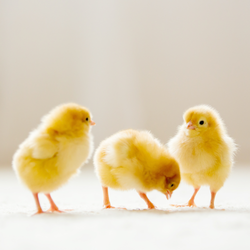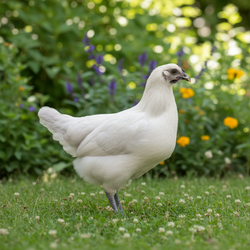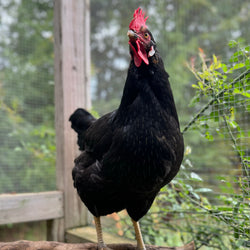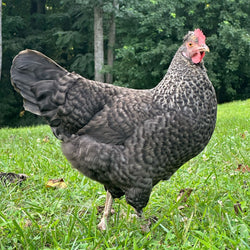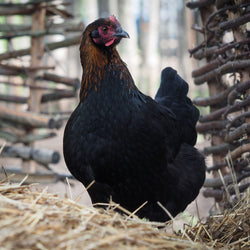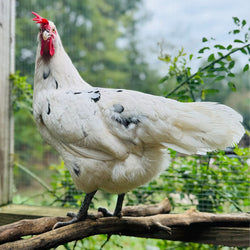www.mypetchicken.com/blogs/faqs/tagged/waterfowl-care/--
Frequently Asked Questions
Here we answer the most commonly-asked questions about ordering, chicken care, and more.
What is the life expectancy of ducks and geese?
If cared for properly, ducks can live to 7-10 years, and some exceptional birds may live longer than that. Geese normally live 10-15 years, but there are stories of some that have lived much, much longer--40 years or more! Around 3-5 years, duck fertility and egg production lessen, and many keepers choose not to keep older birds because of this. But there are many reasons to keep ducks into their older age. We discuss some of them here. Other reasons to keep older birds can be found in this creative My Pet Chicken blog article (it refers to chickens but...
Read MoreWhat are mule ducks?
A "mule" duck is a sterile hybrid cross between a Muscovy and a Pekin. Because these two breeds have been genetically isolated for 50 million years, when you breed the two, you get some interesting results. Why cross these two breeds? We're glad you asked! In Europe and in Asia many mule ducks are produced because of their large size, quality liver, and reduced meat fat content. In fact, artificial insemination was developed in ducks because of the desire to produce mule ducks. If left to mate naturally, the fertility rate between Muscovies and Pekins is only 20-30%, but artificial...
Read MoreIs the floor surface important with ducks and geese?
Yes!--it is very important. As babies, ducklings and goslings need a surface they can grip until their leg muscles and hips are strong, just as with baby chicks. If the floor surface is too slippery, they can develop spraddle leg, a condition in which their hip muscles have not developed properly and they are not able to stand. To reduce the risk of spraddle leg, you will want to avoid slick flooring in incubator trays, transport carriers, and brooders. Also, do not use newspaper or cardboard flooring for the first week of their lives. The best bedding is wood shavings,...
Read MoreAt what age do ducks and geese start laying eggs?
Assuming that they have had proper care, lighter-weight duck breeds mature sexually at 17-24 weeks of age and begin laying eggs at that time. Heavier duck breeds usually start laying between 20-30 weeks of age. However, if they reach maturity during winter--just like chickens--ducks may delay laying until the days begin to lengthen and it warms up in the spring. Just before and during production, ducks may exhibit swollen abdomens, large, moist vents, and widely-spread pubic bones. In some breeds, you may see a darkening in feather color, and in others, the bill color may lighten. Normally, geese start laying...
Read MoreHow do you pick up a duck?
Ducks are particularly prone to injuries to their legs and wings, so whenever you attempt to pick one up, make sure that you move deliberately and slowly, preferably not over rocky terrain. Ideally, you can slowly back them into a corner in their run area. If you have to, you can gently stop them using their necks as a "catching handle"--without squeezing--and once you've slowed them down, use one of these techniques: Lightweight and Bantam Ducks - Hook the base of their wings together behind their back with your thumb holding one wing and fingers holding the other. Then place...
Read MoreDo ducks and geese make good pets?
Yes, ducks and geese make good pets! But it's important to remember that they are not dogs or cats - or even chickens! And that's some of the fun of keeping them--learning and loving their awesome quirkiness. Here are some reasons ducks and geese make great pets: Ducks and geese are entertaining! In addition to their natural charm, ducks and geese can be trained to play with toys, play games, do tricks, sit in your lap, and more. They may learn to enjoy a good stroke on the back or neck, and some will even pursue you, demanding to be...
Read MoreCan I keep just one duck or goose?
Having a cute duck follow you around the house or a goose fly along beside your car as you run errands--it's a fun idea, right? After all, it's not every day that to see a duck in a truck or a pet goose on the loose. Wouldn't keeping just one waterfowl like this be fun? Well, yes...maybe. It's possible to keep just one duck or goose--especially if it has not grown up with other waterfowl--since on some level, it thinks it is human. Because ducks and geese are very social animals that can imprint on anyone that shows them attention...
Read MoreCan different waterfowl breeds cross-breed?
Yes, it is genetically possible for any breed of duck to cross with any other breed of duck, and any goose breed can also cross with other breeds of geese. We are not aware of any verified, viable crosses between ducks and geese, however. Sometimes a goose will attempt to mate with a duck, or vice-versa, but even if they mate successfully, the resulting eggs would not be fertile. Each breed will likely prefer to mate with other breeds of similar size, but not always. It can be difficult for a larger bird to catch a smaller breed or for...
Read More







"The Clubhouse" Coop
Easy to assemble and built to last, the Clubhouse Coop is the perfect starter coop for a small flock.

